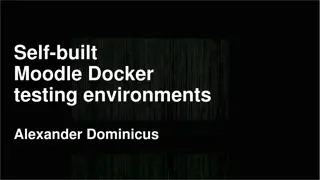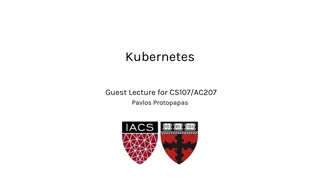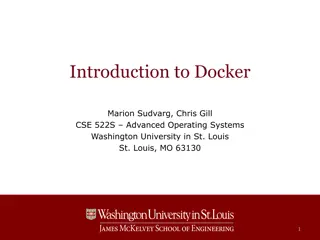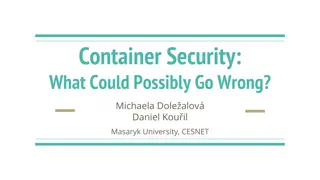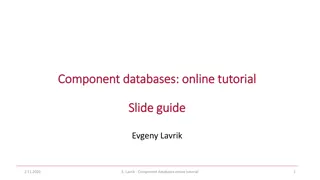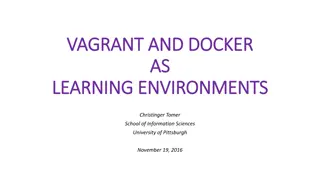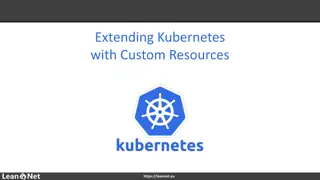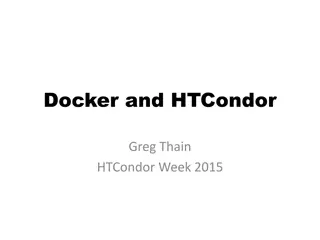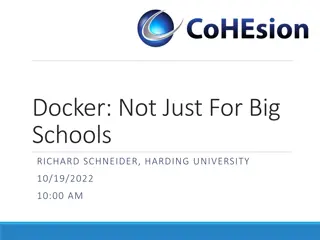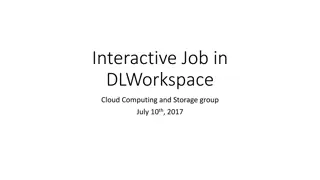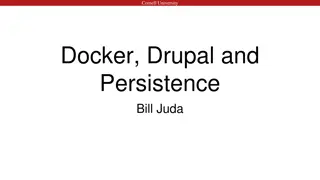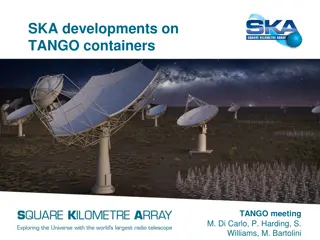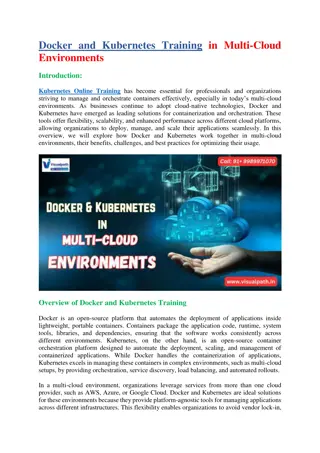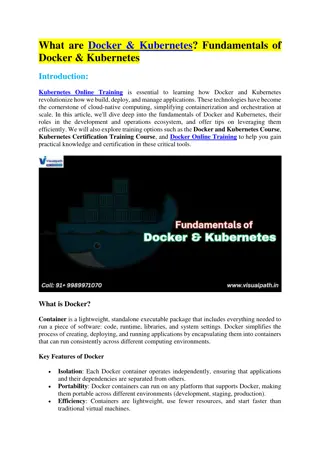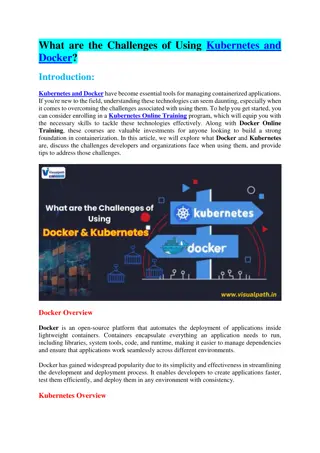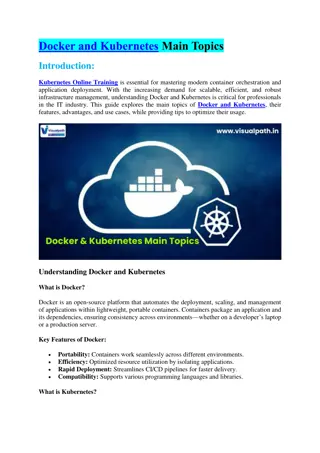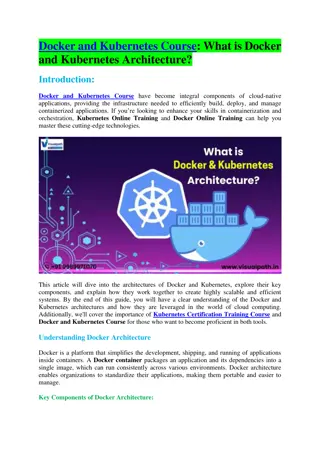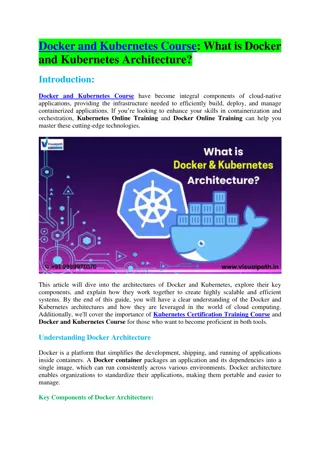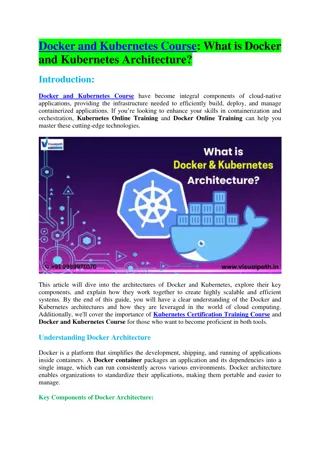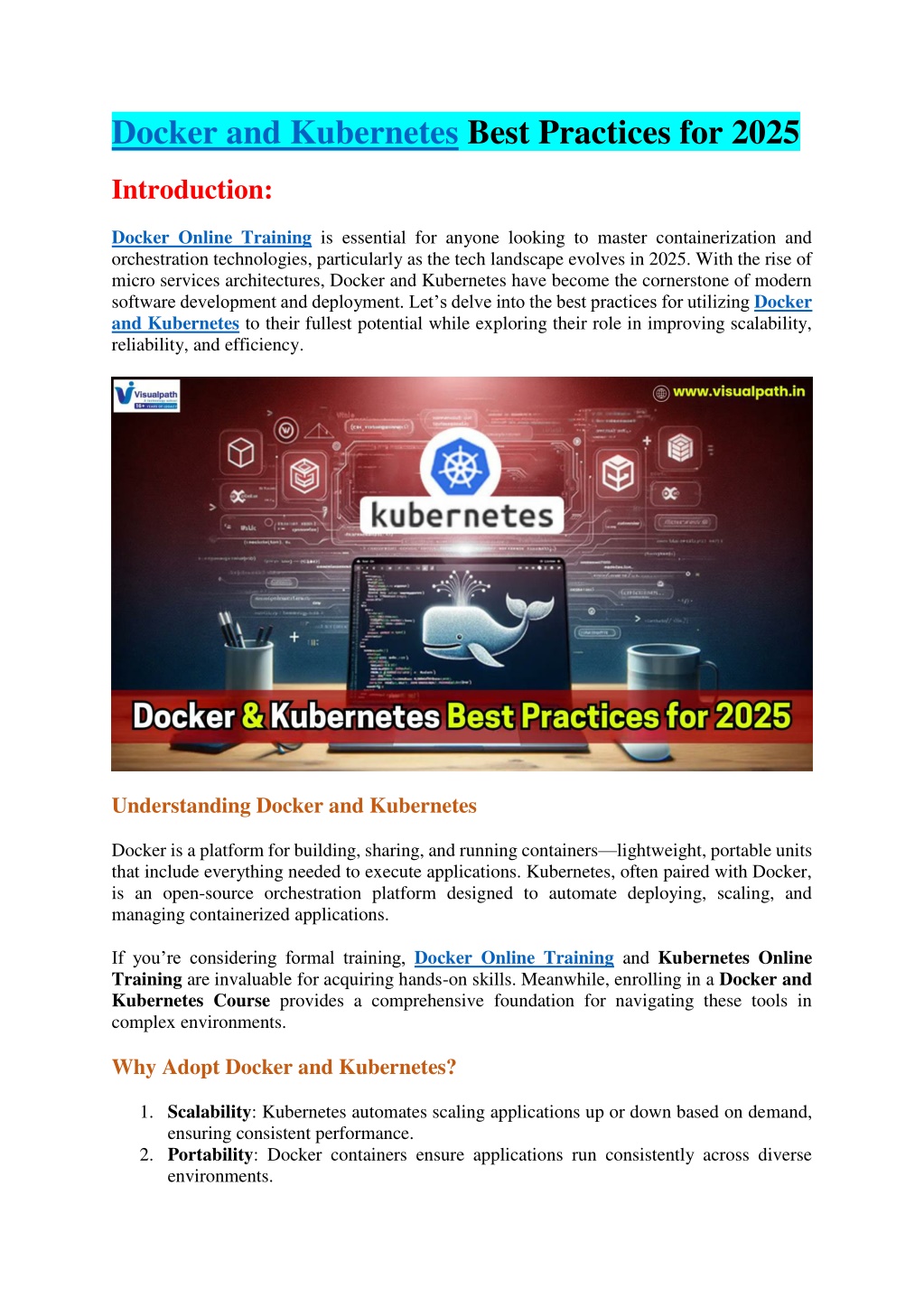
Docker Kubernetes Online - Docker and Kubernetes Course
VisualPath provides expert-led Docker & Kubernetes Training in Hyderabad, focusing on hands-on practice to develop real-world skills. Our Docker Online Training includes daily recordings, detailed presentations, and global accessibility for flexible
Uploaded on | 1 Views
Download Presentation

Please find below an Image/Link to download the presentation.
The content on the website is provided AS IS for your information and personal use only. It may not be sold, licensed, or shared on other websites without obtaining consent from the author. Download presentation by click this link. If you encounter any issues during the download, it is possible that the publisher has removed the file from their server.
E N D
Presentation Transcript
Docker and Kubernetes Best Practices for 2025 Introduction: Docker Online Training is essential for anyone looking to master containerization and orchestration technologies, particularly as the tech landscape evolves in 2025. With the rise of micro services architectures, Docker and Kubernetes have become the cornerstone of modern software development and deployment. Let s delve into the best practices for utilizing Docker and Kubernetes to their fullest potential while exploring their role in improving scalability, reliability, and efficiency. Understanding Docker and Kubernetes Docker is a platform for building, sharing, and running containers lightweight, portable units that include everything needed to execute applications. Kubernetes, often paired with Docker, is an open-source orchestration platform designed to automate deploying, scaling, and managing containerized applications. If you re considering formal training, Docker Online Training and Kubernetes Online Training are invaluable for acquiring hands-on skills. Meanwhile, enrolling in a Docker and Kubernetes Course provides a comprehensive foundation for navigating these tools in complex environments. Why Adopt Docker and Kubernetes? 1.Scalability: Kubernetes automates scaling applications up or down based on demand, ensuring consistent performance. 2.Portability: Docker containers ensure applications run consistently across diverse environments.
3.Efficiency: These technologies enable optimal utilization of resources, reducing costs. 4.Reliability: Kubernetes self-healing capabilities restart failed containers, ensuring high availability. Enrolling in Docker and Kubernetes Online Training will help you leverage these advantages effectively. Best Practices for Docker in 2025 1. Optimize Docker Images Use lightweight base images to reduce image size. Avoid adding unnecessary files or dependencies. Regularly clean up unused images to save space. 2. Follow Security Standards Use trusted base images from official repositories. Regularly scan images for vulnerabilities. Implement role-based access controls (RBAC) for Docker registries. 3. Version Control for Docker files Use explicit versions for base images and dependencies. Keep Docker files simple and modular for better maintainability. 4. Leverage Multi-Stage Builds Utilize multi-stage builds to create lean production-ready images. Separate build-time and runtime dependencies to enhance security. Best Practices for Kubernetes in 2025 1. Use Namespaces for Isolation Segregate environments (e.g., dev, staging, production) with namespaces. Enforce resource quotas and limits per namespace. 2. Monitor and Log Everything Implement tools like Prometheus and Grafana for real-time monitoring. Centralize logging using Fluentd or ELK stack for better troubleshooting. 3. Adopt Infrastructure as Code (IaC) Use tools like Helm or Terraform for consistent and repeatable Kubernetes deployments. Maintain all cluster configurations in version-controlled repositories. 4. Automate Scaling
Configure Horizontal Pod Autoscalers (HPA) to handle traffic spikes. Use Vertical Pod Autoscalers (VPA) for resource optimization. 5. Ensure Security Enforce Pod Security Policies (PSPs) to restrict privileges. Use Kubernetes-native secrets for sensitive data like API keys. Regularly update clusters to patch vulnerabilities. Integrating Docker and Kubernetes Docker simplifies the creation and distribution of containers, while Kubernetes excels at orchestrating them at scale. To maximize the synergy between these tools: Use Kubernetes native container runtime support for Docker images. Define resource requests and limits in Kubernetes manifests to align with Docker container settings. Monitor both platforms using integrated solutions like Data dog. Training and Certification To stay competitive in the evolving tech landscape, professional certifications are crucial. Here s how Docker Online Training, Kubernetes Online Training, and Docker and Kubernetes Online Training can help: 1.Docker Online Training: Focus on containerization fundamentals, security, and efficient image management. 2.Kubernetes Online Training: Master cluster setup, workload orchestration, and scaling strategies. 3.Docker and Kubernetes Course: Combine Docker and Kubernetes expertise for real- world applications and projects. These courses provide hands-on labs, real-world scenarios, and guidance to help you excel in containerization and orchestration. Looking Ahead: Trends for 2025 1.Edge Computing Integration: oKubernetes will increasingly be deployed at the edge to manage distributed workloads efficiently. 2.Serverless Kubernetes: oThe adoption of Kubernetes-based serverless frameworks will simplify application development. 3.AI and ML Workloads: oDocker and Kubernetes will play a pivotal role in scaling AI/ML pipelines. 4.Enhanced Security: oAdvanced tools for vulnerability scanning and runtime protection will emerge. Conclusion
Mastering Docker and Kubernetes is more critical than ever as businesses prioritize agility, efficiency, and scalability. Investing in Docker Online Training, Kubernetes Online Training, or a comprehensive Docker and Kubernetes Course ensures you remain at the forefront of containerization and orchestration technologies. By following the best practices outlined here, you can build resilient, scalable, and secure applications ready to tackle the challenges of 2025 and beyond. Moreover, these technologies enable organizations to stay ahead in a competitive market by offering unmatched reliability and performance. The integration of Docker and Kubernetes not only streamlines operations but also opens doors to innovation in fields like AI, edge computing, and serverless architectures. By implementing these best practices, you position yourself as a forward-thinking professional ready to lead in the rapidly advancing tech landscape. Start your journey today with specialized training to unlock your full potential. Visualpath is the Best Software Online Training Institute in Hyderabad. Avail complete Docker and Kubernetesworldwide. You will get the best course at an affordable cost. Attend Free Demo Call on - +91-9989971070. WhatsApp: https://www.whatsapp.com/catalog/919989971070/ Visit Blog:https://visualpathblogs.com/ Visit:https://www.visualpath.in/online-docker-and-kubernetes-training.html


